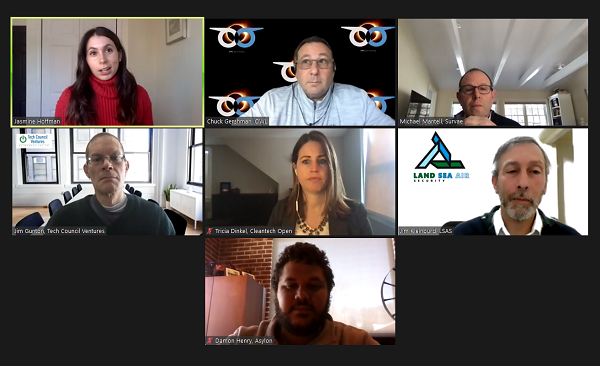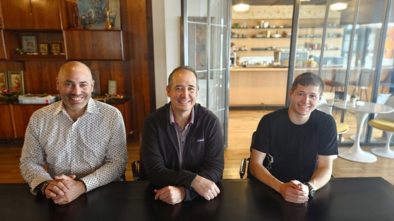TechUnited:NJ Showdown Puts Spotlight on Autonomous Vehicle and Drone Tech
Three startups with ties to the autonomous vehicle and drone industries pitched at the February TechUnited:NJ Startup Showdown.
Winning the event was Owl Autonomous Imaging, pitched by cofounder and CEO Chuck Gershman. The first thing Gershman told the judges was that he was born and raised on the Jersey Shore. Owl, however, is based in Fairport, N.Y.
Judging the event were three investors with experience in the autonomous vehicle or sensor arena. Jim Gunton is managing partner and founder at Tech Council Ventures (Summit). He has invested in privately held growth technology companies for more than 20 years. Mike Mantell is an experienced entrepreneur and an active angel investor who is COO of Survae (Carlsbad, Calif.), a next-generation platform providing data management and visual searches for multidimensional data collected by aerial, ground-based and underwater cameras and sensors. Tricia Dinkel, senior northeast program manager for Cleantech Open (Los Angeles), comes from a background in energy management and environmental policy. The event was moderated by TechUnited:NJ’s Jasmine Hoffman.
Owl Autonomous Imaging
Gershman described Owl as “a solutions company that provides 3D thermal ranging platforms based on proprietary image sensors and software for safe mobility navigation.” The company has had great success with government grants, including a $1.7 million contract awarded in January 2021 to demonstrate the technology to the U. S. Department of Defense, he said. Gershman forecast several other awards for 2021, which would bring the total amount of business to about $3 million.
The company’s 3D thermal sensors solve a problem posed by current imaging systems, he said. Under low-light or no-light conditions or in degraded visual environments caused by smoke, glare or snow, current sensors have been found to be ineffective. Owl’s monocular 3D thermal imager delivers detection, classification, range and velocity under all conditions, while outputting a rich 3D image, the company said in a video played at the virtual meeting. Proprietary autonomous imaging populates the visual image with color. The company’s target markets are in the heavy equipment, robotic, mining, automotive and defense industries.
When Mantell asked about competitors, Gershman mentioned two Israeli companies, as well as a large company, FLIR Systems, which is located in Arlington, Virginia. FLIR was recently acquired by Teledyne (Thousand Oaks, Calif.).
Asylon
Next to present was Damon Henry, cofounder and CEO of Asylon (Philadelphia), which describes itself as an aerial infrastructure company. Asylon offers DroneCore, a system that automates not only the drone, but all of the infrastructure around the drone. The company primarily works in the physical security markets in the Department of Defense space. It also serves companies with large physical plants that cover acres of land.
“We’ve found that you can bring in an automated robotic platform, maybe even one that flies, that can actively respond” to a breach. The platform can be integrated into a company’s security profile so that it can interact with the guard, the cameras and the sensors. This gives companies a layered approach to security that results in fewer false alarms, he stated. Each company has a base station for the drone that protects it, and the drone can fly out at a moment’s notice.
“We see our value in that, by having this automated solution, we’re able to do more flights than most of our competitors, which gives us more data, which gives us better analytics, which ultimately gives us a better customer fit for our customers,” he said.
Gunton asked how the company could expand its customer base, and Henry responded that, as Asylon drones fly over client properties, the company could offer additional services such as asset management or volumetrics. “So, that’s really where we’ve seen the expansion: ‘How do we use the same core product that’s out there already providing ROI [return on investment], and essentially build software integrations and features on top of that, that we can sell to the customer?’”
Land Sea Air Security
The final presentation was made by Jim Kleinburd, CEO of Land Sea Air Security, a Moorestown developer, manufacturer and marketer of perimeter security systems using drones. “Our company is focused on protecting strategic assets, including things like airports, power stations and prisons,” Kleinburd said. He added that the pitch would be focused on the company’s newest product line, which is called “Dronetrap.”
Kleinburd went over the company’s large portfolio and substantial credentials, and then talked about the Dronetrap system. “The Dronetrap is made up of six modules, and it does just three things. First of all, it detects drones. And that might sound like, ‘Of course, it detects drones.’ It’s not so easy. We have not found an instance where we were not able to detect any drone. We like to say we are at 99.9 percent. … The largest drone manufacturer in the world is a Chinese company. … They also have a drone detection system, [but it] only detects the types of drones that they make.” They have 70 percent of the market, so 30 percent of drones get through, he added.
The Dronetrap system also stops drones in midair via proprietary radio-frequency technology. The detected drones either land where they are or go back to their base station, he said.
But what makes Dronetrap unique, he stated, is that “we have the ability to determine where the person is who’s directing that drone. … It typically is someone who’s sitting in a car, two miles away, seeing what the drone is seeing and directing it to where he wants it to go. We’re able to, without using line of sight, determine where that person is sitting” and send out alerts to the authorities.
Asked by Dinkel how Dronetrap competes in the marketplace, Kleinburd noted that his company’s systems will never be the lowest-priced on the market, but they are completely integrated. He also noted that, as far as data collection is concerned, the customer has the choice of involving Land Sea Air or keeping that part of the security operations to itself.




